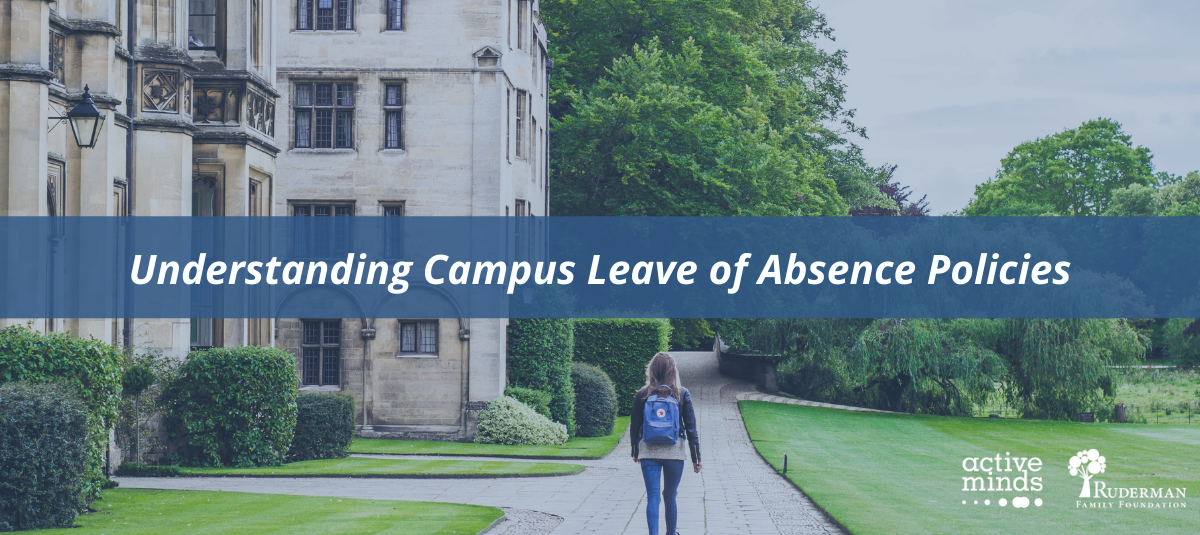Student health, especially mental health, has become a priority in higher education. To better support students that are dealing with a variety of issues, including mental health challenges, many colleges have implemented Leave of Absence (LOA) policies. These policies outline the processes that allow students to take a pause from their studies to focus on their well-being and can be helpful in a variety of circumstances. However, these policies are often underutilized due to limited student awareness, inadequate (or a lack of) campus policies, or other barriers such as course scheduling or financial challenges.
Active Minds partnered with the Ruderman Family Foundation and the Boston University Center for Psychiatric Research to host a series of workshops focused on discussing and evaluating leave of absence policies nationwide, featuring students, faculty, and staff that have diverse experiences with leave of absence policies. Here’s what you should know:
Your Leave at Your PACE – A Student Workshop to Understand Leaves of Absence
The first webinar geared towards students featured Becky Fromm, a graduate student and chapter president at Central Washington University, Kelly Maguire, an undergraduate student, Active Minds SAC member, and chapter president at Florida Gulf Coast University, and Caryn Schmitz, a counselor at Baptist Health Science University and Active Minds chapter advisor and was moderated by Amy Gatto, Senior Manager of Higher Education and Evaluation at Active Minds. During this webinar, panelists discussed the differences between the types of leave a student might take, explained their experiences with campus leave of absence policies, and articulated each component of the acronym PACE (People, Academics, Care, and Engagement). The recording of this workshop can be found here.
Supporting Students Taking a Leave of Absence – A Workshop for Campus Leaders, Faculty, and Staff
The second webinar for faculty, staff, and campus administrators featured Whitney Gregory, Assistant Dean of Students at Elon University, John Davenport, Dean of Students and Assistant Vice President at Illinois State University, Dr. Sara Klein, Assistant Vice President for Student Affairs at Stevens Institute of Technology, and Dr. April Scott, Associate Director of Mental Health Initiatives at the University of South Carolina and was moderated by Alex Kafka, Senior Editor at “The Chronicle of Higher Education.” During this webinar panelists described their schools’ leave of absence policies, discussed the barriers they experienced when developing and implementing leave of absence policies, and explained how institutions, faculty, and staff can support students when returning from leave. Click here to access a recording of this workshop.
Assessing Your Campus Leave of Absence Policy – For students, campus leaders, faculty, and staff
The third webinar was geared towards students, faculty, staff, and campus administrators and featured experts in leave of absence policies. Dr. Daniel Eisenberg from the Healthy Minds Network discussed the mental health needs of college students using data from the Healthy Minds Study. Courtney Joly-Loudermilk and Dr. Dori Hutchinson, the creators of the Leave of Absence Guides from the Center for Psychiatric Rehabilitation at Boston University, gave an overview of best practices for supporting students before, during, and after they take leave of absence. Kelly Davis from Mental Health America discussed the legalities associated with Leave of Absence policies. Finally, Kelly Maguire (Florida Gulf Coast University) and David Mink (Monroe Community College) gave their perspectives as students who decided to take a leave of absence. The recording of our final workshop on Leave of Absence policies can be accessed here.
Additional Resources
If after viewing the workshops, you’re looking for more information on leave of absence policies, we encourage you to check out our Leave of Absence resources listed below.
- Guides from the Ruderman Family Foundation and Boston University Center for Psychiatric Research
- Active Minds’ Transform Your Campus Leave of Absence Guide
Thank you to our panelists, presenters, and moderators for their expertise and the work they do to support college students. To learn more about leave of absence policies visit our website. We hope you’ll continue to put your well-being first and continue to advocate for those who need extra support.




